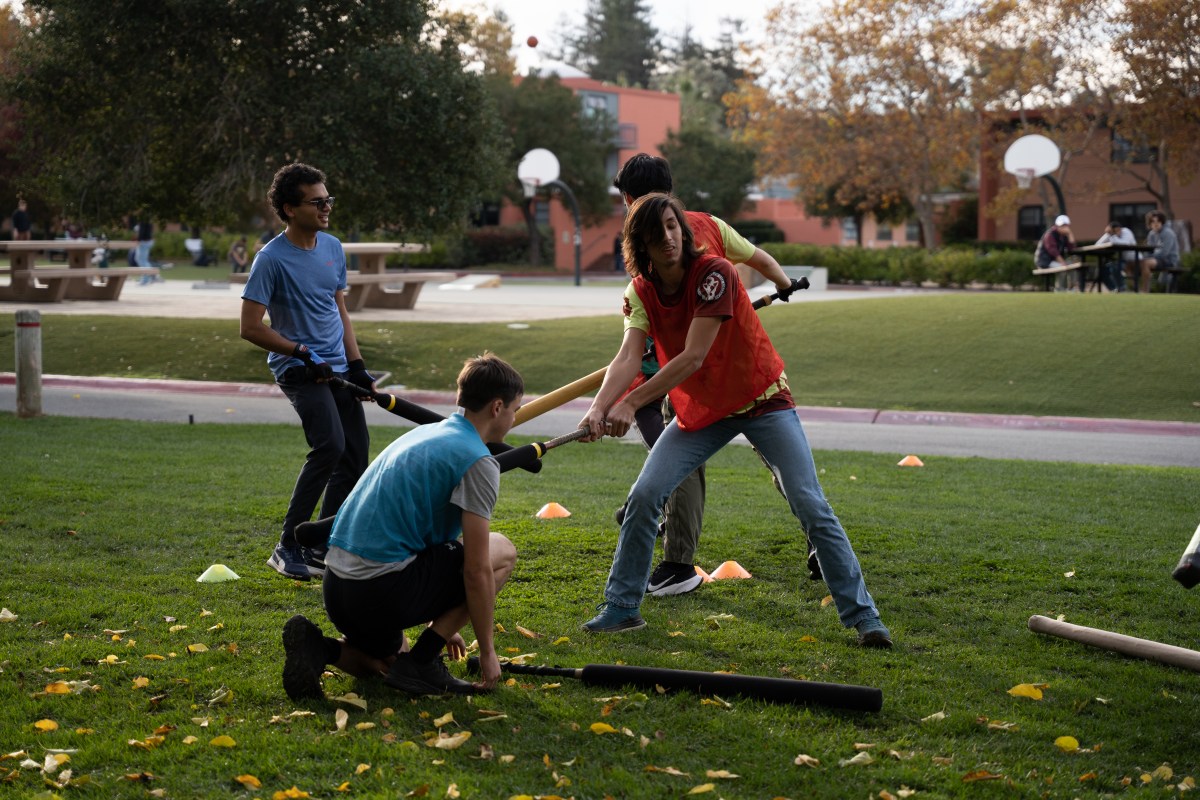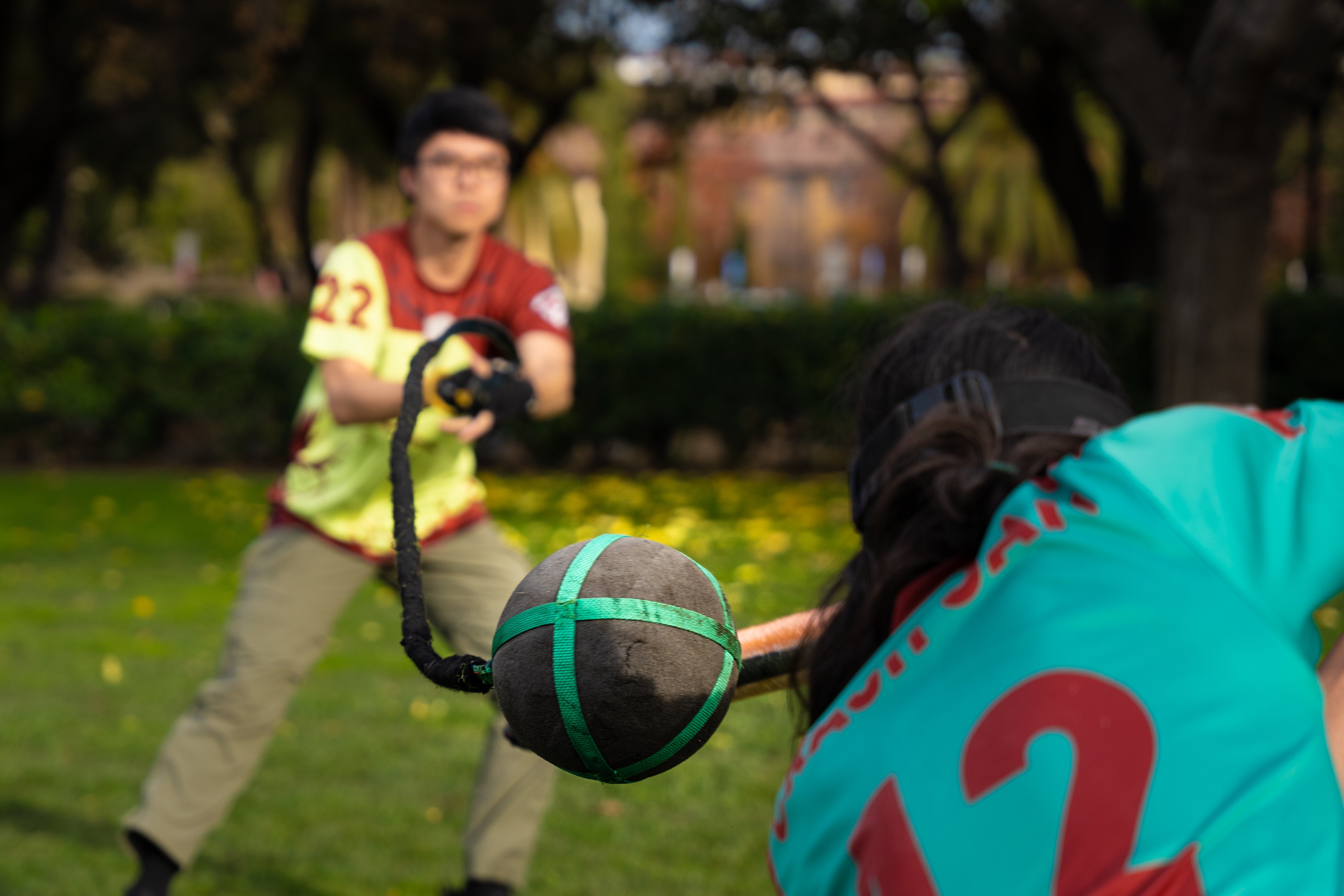Sunday afternoons are typically when Stanford’s campus is at its quietest. That is, unless you happen to walk by Arguello Field and spot a dozen students sparring with handmade longswords, spears and ball-and-chain weapons.
The students belong to Stanford’s jugger team, an unofficial student club that formed during the fall of 2022 and has been meeting for weekly practices ever since.
“I would describe jugger as a five-versus-five field sport with the objective of rugby, where you try to move a ball to the end of the field,” said Jordan Xiao, fifth-year Ph.D. student in biophysics and co-founder of the team. “But instead of tackling people, you fight with foam-padded sticks.”
Xiao first discovered jugger as an undergraduate student at the University of California, Berkeley in 2015. According to him, Berkeley’s team was one of the first in California. The sport itself was created in Germany in the 1990s, inspired by the cult classic sci-fi film “The Salute of the Jugger,” which features a similar fictional game.
Xiao’s love for the niche sport inspired him to start a team of his own at Stanford. The team has been growing steadily since its first appearance at the club fair last year. It is not uncommon for groups of friends passing by an outdoor practice to ask about what is going on, pick up a weapon and join in the game.
“It looks kind of goofy, but once you play, it’s a lot of fun,” Xiao said.
Like capture the flag, but with swords
Julia Gershon ’25 was initially one of the curious students who passed by jugger practices on her way to class. She decided to attend after being convinced by a friend on the team.
“It was a little bit intimidating at first because some of the people on the team are really good and have been doing this for, like, eight years,” Gershon said.
Once she arrived, however, Gershon was pleasantly surprised by how supportive of newer members the team was.
“I didn’t do any team sports in high school because it’s a little bit stressful to not want to let your team down,” Gershon said. “But I’ve never felt that here, everyone just wants to help you.”
A typical practice starts with an explanation of the game’s rules and one-versus-one sparring matches, according to Gershon. Players then choose their equipment before they are split up into two teams to engage in a full game of jugger. Weapon choices include foam longswords, dual-wielded shortswords and a long spear with a foam ball and chain attached to it.
Zinnia Cooperrider ’25, a friend of Gershon’s who also attended a jugger practice on a whim, expected to watch the game from the sidelines during her first practice. When she was immediately invited to take a weapon and start playing, she was surprised by how quickly she was able to pick up the techniques of the sport.
“It’s kind of like riding a bike,” Cooperrider said. “You got to get back on there and keep going.”

Open to everyone
One of the core appeals of Stanford’s jugger team is how accessible it is for players of any skill level, according to Cooperrider.
“It’s always nice to try new things, but I feel like there’s a really high bar for that at Stanford,” Cooperrider said. “It’s really refreshing to have the opportunity to do something without having to have previous knowledge.”
According to Xiao, the team has also attracted members of the greater Stanford community, from high school students in summer programs to Wilbur dining hall staff members. Several team members are also alumni from UC Berkeley’s jugger team and serve as mentors to newer players.
Jacob Szymkowski, a recent Berkeley alum who now works in Mountain View, is a regular at practices. He joined after learning about the team from Xiao.
“Jugger appealed to me because it’s very friendly, even though it’s competitive,” Szymkowski said. “You just come, you have fun and you make friends.”
Szymkowski also helps create most of the team’s handmade weapons, or “pompfen.” The team hosts “build days” where players build pompfen together while socializing or watching movies.
“We like to have that extra connection as a team. It’s nice to have when you’re a college student,” Szymkowski said.
The future of the team
The team’s welcoming community has not held it back from competitive success.
This October, Stanford’s jugger team faced off against seven different teams from across the west coast in an annual tournament known as “Juggerlandia.” Stanford won the tournament, defeating UC Berkeley.
“I have been very impressed with [our players’] dedication and maturity about the sport,” Xiao said. “They’re all coming in with a very growth-oriented mindset, which I think is wonderful.”
Compared to European countries, jugger remains a “very small community” in the United States, according to Xiao. Nevertheless, Xiao is eager to see Stanford’s team grow and achieve official voluntary student organization status while still retaining an inclusive community.
“I think jugger is an opportunity for anyone to get a chance to let off after a long week and meet some really cool new people,” Gershon said. “I mean, there’s nothing more iconic than getting sword-fighting tips at 4 p.m. on a Sunday.”
